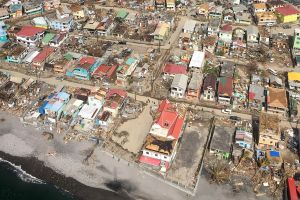WFP Providing Food, Logistics And Telecoms Support To Hurricane-Hit Island Of Dominica
Emergency food supplies from the United Nations World Food Programme (WFP) have been delivered for distribution on the Caribbean island of Dominica which was devastated by Hurricane Maria early last week. The Category 5 hurricane has claimed nearly 30 lives, and damaged an estimated 80 percent of buildings on the mountainous island while many roads have been blocked or damaged.

Some 10 metric tons of WFP high-energy biscuits were transported by ship to the eastern Caribbean island this week and then delivered to communities in the remote interior by helicopter and to coastal communities by boat. Overall, WFP plans to provide a range of food assistance to some 25,000 people for three months. WFP has already discussed with the government a system to supply hurricane-affected people with vouchers to be exchanged for food in local markets once they reopen.
WFP is also providing critical logistics, air service and telecommunications support to Dominica and the humanitarian relief response. The WFP Emergency Telecommunications Team – with the support of experts from the Ericsson Response Team and the Government of Luxembourg — has set up connectivity in Dominica to some 400 registered users including the Government Emergency Operations Centre, the island’s airports and hospitals, and the Dominican, Venezuelan and French fire brigades.
“Dominica has been badly battered and needs to be rebuilt,” says WFP Regional Director for Latin America and the Caribbean, Miguel Barreto, who has visited the island in recent days. “We’re working with the government to support the people who are facing huge challenges in their lives.”
Barreto and UN Resident Coordinator for Barbados and the Organisation of Eastern Caribbean States, Stephen O’Malley, have held discussions with the Prime Minister of Dominica, Roosevelt Skerrit, and visited some of the worst-hit areas.
“We’ve been talking to the government about how to help them get their systems up and running again,” says O’Malley. “People want to go back to their normal lives and we can help them do that.”
WFP’s emergency efforts are part of a larger United Nations operation to provide a range of assistance including disaster relief, humanitarian coordination, shelter and water. On the logistics side, the UN Humanitarian Response Depot (UNHRD) in Panama and the UN Humanitarian Air Service (UNHAS) – both managed by WFP — are providing support to humanitarian partners in Dominica and the region.
The UNHRD in Panama has been airlifting critical emergency supplies, including mobile storage units and pallets, tarpaulins, boats, and electric generators to support needs while UNHAS has been providing regular flight services to humanitarian workers, government officials and partners.
Two vessels from the Royal Dutch Navy and their crew have been assisting the humanitarian community in transporting food and non-food items from Antigua to Dominica.
In the wake of a series of hurricanes which have ravaged the Caribbean, WFP – from its operational hubs in Barbados and Antigua - has been working closely with the Caribbean Disaster Emergency Management Agency, island governments and international partners.
Source:World Food Programme
- 298 reads
Human Rights
Ringing FOWPAL’s Peace Bell for the World:Nobel Peace Prize Laureates’ Visions and Actions

Protecting the World’s Cultural Diversity for a Sustainable Future

The Peace Bell Resonates at the 27th Eurasian Economic Summit

Declaration of World Day of the Power of Hope Endorsed by People in 158 Nations

Puppet Show I International Friendship Day 2020

